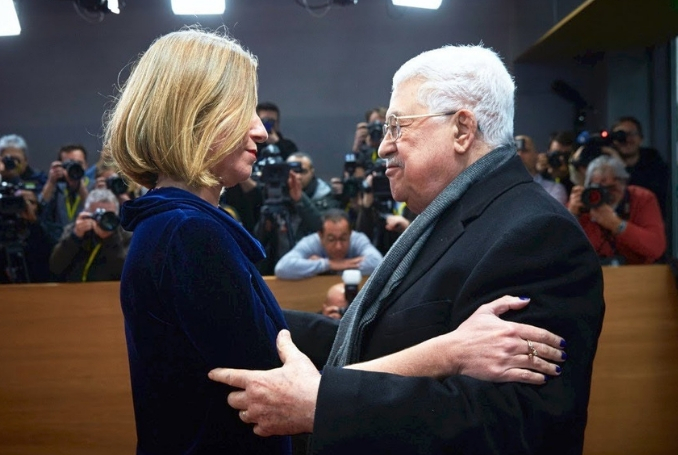
By Ramona Wadi
The Palestinian Authority’s spin on “legitimate Palestinian endorsement” is equivalent to its fast-fading status. Since US President Donald Trump broke away from international consensus on Jerusalem and unilaterally declared the city as Israel’s capital, the PA has been seeking the limelight by rhetorically opposing US actions against Palestine.
In a recent statement, spokesman for PA leader Mahmoud Abbas, Nabil Abu Rudeineh, stated:
“The position of the President and the Palestinian leadership from the constants, particularly Jerusalem, the prisoners, and the Palestinian identity, will foil any plot, or workshop, or meeting.”
Abu Rudeineh also made sweeping reference to international support for Palestine. However, yesterday it was reported that the EU is “ready to work with the US administration on the basis of its longstanding position, including the commitment to a negotiated two-state solution and agreed international parameters.”
According to the Times of Israel, the EU will be sending a representative to the conference. In in the words of EU Foreign Policy Chief Federica Mogherini, sending a representative “does not infringe on any of these very clear commitments.”
So, what constitutes Palestinian legitimate endorsement? The PA has endorsed many narratives which are detrimental to the Palestinian cause, including its concessionary attitude regarding the right of return and its fluctuating interpretations of historic Palestine, of which Jerusalem is a part.
If the PA’s interpretation of such endorsement is applied, there is little that constitutes Palestinian demands. The PA speaks of Palestinians only in terms of how the international community has fabricated their identity. Such an endorsement is a betrayal of the Palestinian cause.
Contrary to PA statements, boycotting the Bahrain summit is the only action the PA can take, but which enables it to betray Palestinian rights through the two-state compromise. It is true that Palestinians have rejected the summit, but for reasons that do not coincide with those espoused by the PA.
Palestinians know that the EU’s approach to the US will not signal any progress in their political demands, but will merely extend the two-state rhetoric until it is no longer feasible to speak about it. The PA is adopting the same tactics, as international consensus stipulates that Palestinian demands must be decided externally and then forced upon the Palestinians despite these being in opposition to their aspirations.
If any truth is to be gleaned from official PA rhetoric, it is the fact that there is no hesitation on its part to insist on a non-existent unity between the leadership and the people in order for the former to divert attention away from all the issues that remain unaddressed. Despite all the hype about the forthcoming summit, it must be remembered that the two-state also reduces Palestinians to a humanitarian project without autonomy.
Palestinians do not demand a choice between two oppressive options. Only the PA is insisting upon this trajectory because it might still stand to gain from its concoctions of Palestinian demands and international consensus.
Ask Palestinians why they opposed the summit: the two-state compromise and international consensus – both of which are instruments of colonial theft – will definitely not feature among their political demands which are based upon liberation.
– Ramona Wadi is a staff writer for Middle East Monitor, where this article was originally published. She contributed this article to the Palestine Chronicle.







